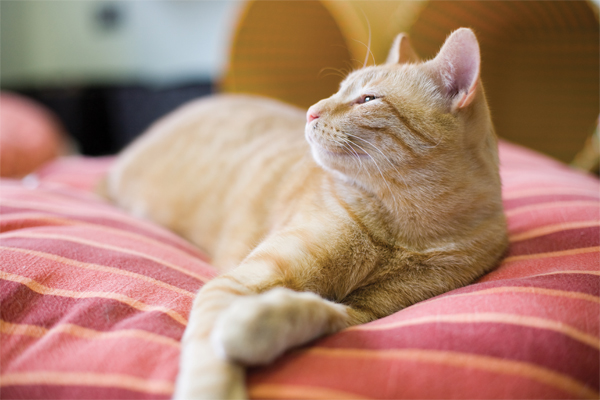PAWS Chicago at the Forefront of Groundbreaking Shelter Medicine Study
by Dr. Annette L. Litster | Nov 01, 2010
Study of FIV-infected cats aims to increase understanding of the disease and create best practices to improve long-term health of FIV+ cats.

What is Feline Immunodeficiency Virus?
Feline Immunodeficiency Virus, or FIV, is a disease that suppresses the immune system of cats, leaving them potentially more vulnerable to infections and illnesses that healthy cats with strong immune systems would be protected against. The disease is typically spread among cats though the saliva transmission via bite wounds. Similar to HIV in humans, FIV is not contracted through casual contact.
While FIV-infection in cats is sometimes associated with poor health (including fever, poor coat condition, enlarged lymph nodes, and weight loss), many FIVpositive cats live long and healthy lives without signs of infection. However, with the limited information known about cats living with FIV, an accurate prognosis is very difficult for veterinarians to provide.
When diagnosed with FIV, the life-expectancy of an infected cat can be very good. However, some cats will eventually succumb to the effects of the virus on the immune system and infection progresses to feline AIDS. In traditional shelter settings, FIV-infected cats are often euthanized immediately following the diagnosis, mostly because so little is known about the possible outcome for pet cats infected with the virus.
Because the outcome of infection can be so variable, it is important to be able to predict whether a cat has a good prognosis or is likely to go on to develop AIDS so that veterinarians, animal shelters and cat adopters can make better, more informed decisions about the wellbeing of the cats under their care.
A Groundbreaking Study
A collaborative and groundbreaking project is taking place between PAWS Chicago, Purdue University, Bristol University, Glasgow University and the Fitzhugh B. Crews FIV Cat Sanctuary, to study naturally occurring FIV-infection in cats and determine the specific effects of the infection. This study, which will follow 150 cats over a 5-year span, was launched in November 2009 and is the first of its kind to document naturally-infected real-life cases. The study aims to investigate what actually happens to a cat when infected with FIV, to understand the important clinical indicators that will predict whether disease will progress or not and to develop management practices that improve the long-term health of FIV-infected cats.
The results of the study will be of particular importance among animal shelters as 1.5 to 3 percent of healthy cats are infected with FIV and up to 15 percent of cats that are sick are FIV-infected. Of these cats, many are euthanized annually in shelters simply because they are FIV positive. Evidence from this study will reduce these deaths by generating practical information regarding prognosis and optimal health management practices for cats living with FIV.
Cats participating in the humane study from PAWS Chicago are a part of the organization’s adoption program, while those from Fitzhugh B. Crews FIV Cat Sanctuary in Memphis, TN are cats who permanently live at the sanctuary.
PAWS Chicago has been a huge proponent of welcoming FIV-infected cats into its adoption program and has seen significant success in the adoptions of these special cats who make such wonderful pets. Studies like these are so important for the future of managing animals with this type of disease at PAWS Chicago and other animal shelters so that every cat is given the chance to life a healthy, happy life.
